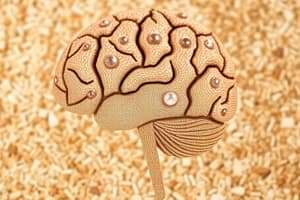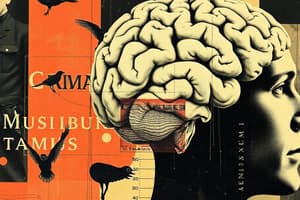Podcast
Questions and Answers
Which of the following best defines intelligence?
Which of the following best defines intelligence?
- The ability to memorize information
- The ability to perform physical tasks
- The ability to communicate effectively
- The ability to reason logically (correct)
What is the consensus definition of intelligence?
What is the consensus definition of intelligence?
- A specific mental process
- A measurable quantity
- An innate characteristic
- A general reasoning ability (correct)
What are the two main classes of intelligence theories?
What are the two main classes of intelligence theories?
- Emotional intelligence theories and social intelligence theories
- Behavioral theories and cognitive theories
- Factor-analytic theories and information-processing theories (correct)
- Nature-based theories and nurture-based theories
What is factor analysis used for in intelligence theories?
What is factor analysis used for in intelligence theories?
What did Spearman's two-factor theory of intelligence propose?
What did Spearman's two-factor theory of intelligence propose?
What did Thurstone's primary mental abilities propose?
What did Thurstone's primary mental abilities propose?
Which theory sought to de-emphasize, if not eliminate, reference to g?
Which theory sought to de-emphasize, if not eliminate, reference to g?
What did the Cattell Horn Model propose?
What did the Cattell Horn Model propose?
Which cognitive abilities peak around the age of 25 to 30?
Which cognitive abilities peak around the age of 25 to 30?
What does Cattell's theory explain about the positive manifold?
What does Cattell's theory explain about the positive manifold?
How many broad ability factors did Horn propose in addition to gf and gc?
How many broad ability factors did Horn propose in addition to gf and gc?
How are the intelligence factors inter-correlated?
How are the intelligence factors inter-correlated?
Which of the following best defines intelligence?
Which of the following best defines intelligence?
What is the consensus definition of intelligence?
What is the consensus definition of intelligence?
What are the two main classes of intelligence theories?
What are the two main classes of intelligence theories?
What is factor analysis used for in intelligence theories?
What is factor analysis used for in intelligence theories?
What did Spearman's two-factor theory of intelligence propose?
What did Spearman's two-factor theory of intelligence propose?
What did Thurstone's primary mental abilities propose?
What did Thurstone's primary mental abilities propose?
Which theory sought to de-emphasize, if not eliminate, reference to g?
Which theory sought to de-emphasize, if not eliminate, reference to g?
What did the Cattell Horn Model propose?
What did the Cattell Horn Model propose?
Which cognitive abilities peak around the age of 25 to 30?
Which cognitive abilities peak around the age of 25 to 30?
What does Cattell's theory explain about the positive manifold?
What does Cattell's theory explain about the positive manifold?
How many broad ability factors did Horn propose in addition to gf and gc?
How many broad ability factors did Horn propose in addition to gf and gc?
How are the intelligence factors inter-correlated?
How are the intelligence factors inter-correlated?
Which of the following best describes intelligence?
Which of the following best describes intelligence?
What is the consensus definition of intelligence?
What is the consensus definition of intelligence?
What are the two main classes of intelligence theories?
What are the two main classes of intelligence theories?
What is Spearman's two-factor theory of intelligence?
What is Spearman's two-factor theory of intelligence?
What is Thurstone's primary mental abilities theory?
What is Thurstone's primary mental abilities theory?
What is the Cattell Horn Model?
What is the Cattell Horn Model?
What is the relationship between memory span, processing speed, and reasoning ability with age?
What is the relationship between memory span, processing speed, and reasoning ability with age?
What is Guilford's Structure of Intellect Model?
What is Guilford's Structure of Intellect Model?
What is Gardner's Theory of Multiple Intelligences?
What is Gardner's Theory of Multiple Intelligences?
What is the explanation for the positive manifold according to Cattell's theory?
What is the explanation for the positive manifold according to Cattell's theory?
How are the intelligence factors related to each other?
How are the intelligence factors related to each other?
What is the focus of factor-analytic theories of intelligence?
What is the focus of factor-analytic theories of intelligence?
Flashcards are hidden until you start studying
Study Notes
Theories of Intelligence: A Comprehensive Overview
- Intelligence is a multifaceted capacity with the abilities to acquire and apply knowledge, reason logically, make sound judgments and solve problems, infer perceptively, and grasp and visualize concepts.
- Psychologists initially struggled to define intelligence, but a consensus definition emerged that defines intelligence as a "general reasoning ability."
- The two main classes of intelligence theories are factor-analytic theories and information-processing theories.
- Factor-analytic theories use factor analysis to identify the ability or groups of abilities that constitute intelligence, while information-processing theories focus on identifying the specific mental processes that constitute intelligence.
- Spearman's two-factor theory of intelligence proposed the existence of a general intellectual ability factor (g) that is partially tapped by all other mental abilities, as well as specific abilities (s).
- Thurstone's primary mental abilities proposed that intelligence is defined by seven independent primary mental abilities (PMAs), but he later accepted the existence of g.
- Other multiple-factor models of intelligence have been proposed that have sought to de-emphasize, if not eliminate, reference to g, such as Guilford's Structure of Intellect Model and Gardner's Theory of Multiple Intelligences.
- The Cattell Horn Model proposed that the original g factor of Spearman actually breaks down into two major cognitive abilities: fluid intelligence (gf) and crystallized intelligence (gc).
- Memory span, processing speed, and reasoning ability peak around the age of 25 to 30, while vocabulary (a crystallized ability) peaks at around 65 to 70 and decreases only minimally into people's 80s.
- Cattell's theory explains the positive manifold by stating that both gf and gc are general ability factors that are strongly correlated because gf, in part, causes gc via investment.
- Horn proposed an additional eight broad ability factors that subsume many different narrow ability factors.
- The intelligence factors are inter-correlated positively with each other.
Studying That Suits You
Use AI to generate personalized quizzes and flashcards to suit your learning preferences.




